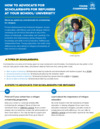Return of 2,400 Somali refugees leads to closing of third camp in Ethiopia
The voluntary return of more than 2,400 Somali refugees last week brings to more than 50,000 the number of voluntary repatriations last year and leads to the closing of a third refugee camp in Ethiopia.

ADDIS ABABA, Ethiopia, Jan. 2 (UNHCR) - The repatriation of thousands of Somali refugees from Ethiopia has continued at a steady pace, reflecting a more stable situation in parts of the east African country and leading to the closing of three of eight refugee camps.
Two convoys last week repatriated 2,412 people from Ethiopia's Daror camp to north-west Somalia, bringing the total number of refugees who returned home in 2001 to 50,216. The latest returnees received a nine-month food ration, plastic sheeting and blankets to help them restart their lives.
The Daror complex, which includes health clinics, schools, water systems and generators, and which once hosted 50,000 refugees, will be handed over by UNHCR to the local community.
Earlier last year, Teferiber and Dawarnaji camps were also closed.
Another estimated 67,000 Somalis who fled following the outbreak of widespread civil war a decade ago remain in five other camps in Ethiopia. More than half are expected to return home by June, but some 30,000 others from southern Somalia cannot be repatriated because the security situation in that part of the country remains unstable.
Related news and stories
Thousands of newly arrived Somali refugees in Ethiopia relocated to new settlement
Samira's Story
Drought brings life-threatening food shortages for refugees in Ethiopia
100,000 new Somali refugees arrive in Ethiopia in the past month, UN and partners are calling for urgent funding
UNHCR teams and partners rush assistance to some 100,000 newly arrived Somali refugees in hard-to-reach area of Ethiopia
As the Horn of Africa drought enters a sixth failed rainy season, UNHCR calls for urgent assistance
-

How to advocate for scholarships for refugees at your school or university
2022 Stand up, speak out, and advocate for scholarships for refugees -

Evaluation of the caring for refugees with non-communicable diseases project
31 Dec 2021 This evaluation (full report) assesses the relevance, coherence, effectiveness, efficiency, impact and sustainability of a capacity-building project, entitled "Caring for Refugees with Non-communicable diseases Project". The project aimed to improve the quality of non-communicable diseases care for refugees in UNHCR's care. The findings of the evaluation will be used to support learning and accountability; to guide programme practices to improve non-communicable diseases care in refugee operations; and to document lessons learned from implementation and field practice. Attachments: Executive Summary and Management Response (.zip) -

Evaluation of UNHCR's Child Protection Programming 2017-2019
31 Dec 2021 This evaluation reviewed the United Nations High Commissioner for Refugees' child protection response in terms of its leadership role, strategies and programme performance with the purpose of informing the future of both UNHCR's child protection strategy and the implementation of UNHCR child protection programming. Attachments: Management Response Child Protection evaluation (.pdf) -

ES/2021/09 Evaluation of the Somos Panas Colombia Communication Campaign
31 Dec 2021 UNHCR in Colombia developed the Somos Panas ("We Are Buddies") Campaign to discourage expressions of xenophobia and promote empathy and solidarity towards Venezuelans to the benefit of society. This evaluation report evaluated the entire campaign and provides recommendations to improve actions during the next campaign cycle. Attachments: ES/2020/01 Executive Summary, Spanish version and Management Response (.zip) -

ES/2021/10 Evaluation of the project "Saving Maternal and Newborn Lives in Refugee Situations" in Cameroon, Chad and Niger.
31 Dec 2021 The United Nations High Commissioner for Refugees (UNHCR) commissioned this evaluation for the purpose of accountability and learning to inform future similar interventions. It examines the relevance, effectiveness and sustainability of the UNHCR and Bill and Melinda Gates Foundation (BMGF) project: "Saving maternal and newborn lives in refugee situations", implemented in three refugee operations in Chad, Niger and Cameroon between April 2018 and December 2019. Attachments: UNHCR Evaluation Management Response (.pdf) -

ES/2021/11 Mid-Term Process Evaluation of the IKEA Foundation Livelihoods and Energy Projects Among Somali Refugees and Host Communities in Ethiopia
31 Dec 2021 This decentralised mid-term process evaluation of Phase 3 (2019-21) of the IKEA Foundation- funded livelihoods and energy investment among the Somali refugees and host community was commissioned by the UNHCR Ethiopia/Melkadida sub-office (SOMEL). The purpose of the evaluation was to gauge the follow-up on baseline recommendations and assess the progress made toward creating sustainable livelihoods and fostering economic inclusion for refugees and their hosts in this region. Attachments: UNHCR Evaluation Management Response (.pdf) -

Evaluation Service - COVID-19 Evaluative Evidence Brief No 1
28 Dec 2021 To support organizational learning, UNHCR's Evaluation Service has commissioned an Evaluative Synthesis of UNHCR's adaptation and response to the COVID-19 pandemic. The purpose of the synthesis is to provide robust and timely evidence to UNHCR on how effectively the organisation has adapted to COVID-19 and to highlight areas of strength as well as the challenges emerging from across our evaluations. -

UNHCR regrets loss of life in the Aegean Sea, with at least 31 dead and more missing
28 Dec 2021 -

Amid surge in arrivals from Venezuela, UNHCR steps up response in the north of Chile
23 Dec 2021
